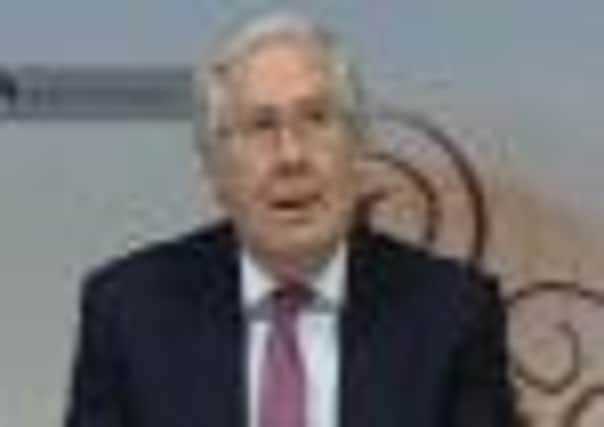Bank warns of ‘storm from Europe’


Sir Mervyn’s warning came as the Bank said the UK economy will not return to pre-financial crisis levels before 2014 after it cut its growth forecasts for the next two years. The Bank now expects growth of around 0.8% this year.
And the squeeze on consumer spending is set to maintain its grip as the rate of inflation falls more slowly than previously expected, remaining above the Government’s 2% target for the next year or so.
Advertisement
Hide AdAdvertisement
Hide AdWhile the Bank said it did not see a “meaningful way” of factoring in an extreme financial event - such as the collapse of the euro - into its projections, it said the biggest risk to recovery stems from the single currency bloc, the UK’s main trading partner.
GDP is expected to grow around 2% in 2013, compared with the Bank’s previous estimate of around 3%.
Meanwhile, the consumer prices index (CPI) rate of inflation is not likely to meet the 2% target until mid-2013, rather than the end of the year, and will still be around 2.5% at the end of this year.
Sir Mervyn said weak growth and high inflation have been the unavoidable consequences of the financial crisis, that have been “painful for everyone in our society”.
Advertisement
Hide AdAdvertisement
Hide AdHowever, Sir Mervyn said the bigger picture was one of gradual recovery in growth.
He said: “We are navigating through turbulent waters, with the risk of a storm heading our way from the continent.”
Alluding to Manchester City’s last-minute win on Sunday securing the Premier League title, Sir Mervyn added: “Uncertainty can sometimes add a certain spice to life - as we saw vividly in the conclusion to the Premier League season at the weekend - but it has the opposite effect on the economy.
“We don’t know when the storm clouds will move away.”
Prime Minister David Cameron’s official spokesman said: “What... the Bank of England forecasts reflect are the same issues taken into account by the Office for Budget Responsibility when it produced its forecasts at the time of the Budget.
Advertisement
Hide AdAdvertisement
Hide Ad“The governor is highlighting higher-than-expected inflation and obviously the biggest risk to the economy is what is happening in the eurozone.”
Vicky Redwood, chief UK economist at Capital Economics, said the report painted a “pretty gloomy picture” but did not suggest the resumption of the Bank’s quantitative easing programme was imminent.
She added: “Growth is now expected to be rather weaker than in February, yet sticky inflation means that the Bank sees little scope for further quantitative easing.”
The Bank’s gloomier view of the UK comes after official figures showed the economy had slipped back into recession following a 0.2% contraction in output in the first quarter of the year.
Advertisement
Hide AdAdvertisement
Hide AdIts report said growth was not likely to surpass “pre-crisis level before 2014, some six years after the start of the recession”.
The report said inflation was likely to remain above the 2% target for the next year or so, with projected increases in utility prices later this year adding more to CPI inflation than projected three months ago.
Turmoil in the eurozone continues to escalate after Greek political leaders failed to form a coalition government, forcing a new election in June.
The country could be denied further EU bailout funds if a party opposing necessary austerity measures comes to power, which could in turn lead to Greece exiting the euro.
Advertisement
Hide AdAdvertisement
Hide AdBut the Bank said it did not see a “meaningful way” to quantify the impact of such extreme financial events and did not include them in its projections.
It said: “The likelihood that the substantial challenges within the euro area will lead to significant economic and financial disruption continues to pose the greatest threat to the UK recovery.”
Sir Mervyn confirmed plans were being drawn up by the Bank, the Treasury and Financial Services Authority in the event of a worst-case scenario such as the break-up of the eurozone.
He added: “Contingency plans are being discussed and have been for some time.”